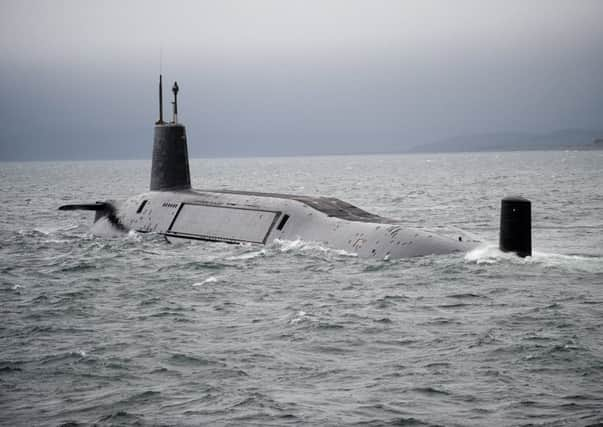Leader: Trident exposes lack of unity in Labour


The leader of the opposition, Jeremy Corbyn, currently stands in opposition to his own party’s policy on the matter. While Corbyn is committed to scrapping the nuclear deterrent, Labour’s official position is that its retention should be reviewed.
Trident was destined to become a thorny issue for Labour as soon as Corbyn was elected party leader. The MP had spent four years as chairman of the controversial Stop the War Coalition and has a long history of support for the Campaign for Nuclear Disarmament. Given that a great many of his colleagues – in both Westminster and Holyrood – remain in favour of Trident, or a comparable replacement, Corbyn’s election saw him at odds with members of his own team.
Advertisement
Hide AdAdvertisement
Hide AdThe Labour leader’s decision to place former London mayor Ken Livingstone at the head of a review of the party’s defence policy infuriated many in his party who believed – not unreasonably – that his findings were a foregone conclusion. It seemed impossible that Livingstone might suggest anything other than the adoption of a formal no-nukes position.
The installation of Emily Thornberry as shadow defence secretary led to Livingstone walking away from the project. This was no rebellion against Thornberry. Rather, Livingstone is confident that Thornberry will reach a conclusion with which he is happy.
Yesterday, at a conference hosted by the union Unite in Clydebank, we saw the clearest evidence that Labour remains in turmoil over Trident. Senior figures within Scottish Labour are hopelessly divided on the matter. And both sides hope that they can influence the review being undertaken by Thornberry. Only one side can win this argument. And, right now, it would appear those opposed to Trident have the upper hand.
Pro-Trident Labour MSP Jackie Baillie – whose Dumbarton constituency includes the Faslane naval base – hopes that Thornberry will listen to her concerns about the impact on jobs that would be caused by scrapping Trident.
Nobody, Baillie points out, wants to see nuclear weapons used but the effect of the abolition of Trident for those working at Faslane would be disastrous. Meanwhile, MSP Neil Findlay – who chaired Corbyn’s leadership campaign in Scotland – wants to see Scottish Labour push for the weapons system to be scrapped.
Just as Labour is divided over Trident, so are Scots, with a slight majority in favour of retaining the system. Among those who hold this view is Scottish Labour leader Kezia Dugdale.
It is hard to see how the issue of Trident can do anything but cause further ruptures in a Labour Party that is already split.
For some, ideology must come before pragmatism and their opposition to Trident will never be shaken. But others believe the party should take into account both public support for a nuclear deterrent and concerns over the loss of jobs resulting from ditching nuclear weapons.
Advertisement
Hide AdAdvertisement
Hide AdUncomfortable disagreements should not be used as an excuse to silence debate. Labour is to be commended for its willingness to hold this very public discussion, despite the risks to the party’s image and its poll support.
The victors, however, when Labour has come to a formal position, will be the Conservatives and the SNP. They hold opposing views – Tories for and nationalists against – on Trident, but members are united. There are no damaging splits. Labour, on the other hand, entered a process that exposes – and will continue to expose – a lack of unity in the party.
Both First Minister Nicola Sturgeon and Prime Minister David Cameron have much to gain from Labour’s debate on the future of Trident.